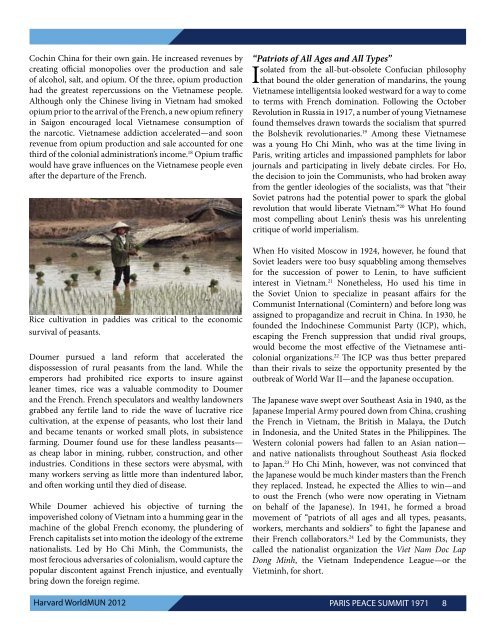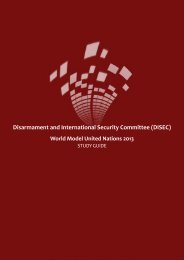Paris Peace Summit, 1971 - World Model United Nations
Paris Peace Summit, 1971 - World Model United Nations
Paris Peace Summit, 1971 - World Model United Nations
Create successful ePaper yourself
Turn your PDF publications into a flip-book with our unique Google optimized e-Paper software.
Cochin China for their own gain. He increased revenues by<br />
creating ocial monopolies over the production and sale<br />
of alcohol, salt, and opium. Of the three, opium production<br />
had the greatest repercussions on the Vietnamese people.<br />
Although only the Chinese living in Vietnam had smoked<br />
opium prior to the arrival of the French, a new opium renery<br />
in Saigon encouraged local Vietnamese consumption of<br />
the narcotic. Vietnamese addiction accelerated—and soon<br />
revenue from opium production and sale accounted for one<br />
third of the colonial administration’s income. 18 Opium trac<br />
would have grave inuences on the Vietnamese people even<br />
aer the departure of the French.<br />
Rice cultivation in paddies was critical to the economic<br />
survival of peasants.<br />
Doumer pursued a land reform that accelerated the<br />
dispossession of rural peasants from the land. While the<br />
emperors had prohibited rice exports to insure against<br />
leaner times, rice was a valuable commodity to Doumer<br />
and the French. French speculators and wealthy landowners<br />
grabbed any fertile land to ride the wave of lucrative rice<br />
cultivation, at the expense of peasants, who lost their land<br />
and became tenants or worked small plots, in subsistence<br />
farming. Doumer found use for these landless peasants—<br />
as cheap labor in mining, rubber, construction, and other<br />
industries. Conditions in these sectors were abysmal, with<br />
many workers serving as little more than indentured labor,<br />
and oen working until they died of disease.<br />
While Doumer achieved his objective of turning the<br />
impoverished colony of Vietnam into a humming gear in the<br />
machine of the global French economy, the plundering of<br />
French capitalists set into motion the ideology of the extreme<br />
nationalists. Led by Ho Chi Minh, the Communists, the<br />
most ferocious adversaries of colonialism, would capture the<br />
popular discontent against French injustice, and eventually<br />
bring down the foreign regime.<br />
“Patriots of All Ages and All Types”<br />
Isolated from the all-but-obsolete Confucian philosophy<br />
that bound the older generation of mandarins, the young<br />
Vietnamese intelligentsia looked westward for a way to come<br />
to terms with French domination. Following the October<br />
Revolution in Russia in 1917, a number of young Vietnamese<br />
found themselves drawn towards the socialism that spurred<br />
the Bolshevik revolutionaries. 19 Among these Vietnamese<br />
was a young Ho Chi Minh, who was at the time living in<br />
<strong>Paris</strong>, writing articles and impassioned pamphlets for labor<br />
journals and participating in lively debate circles. For Ho,<br />
the decision to join the Communists, who had broken away<br />
from the gentler ideologies of the socialists, was that “their<br />
Soviet patrons had the potential power to spark the global<br />
revolution that would liberate Vietnam.” 20 What Ho found<br />
most compelling about Lenin’s thesis was his unrelenting<br />
critique of world imperialism.<br />
When Ho visited Moscow in 1924, however, he found that<br />
Soviet leaders were too busy squabbling among themselves<br />
for the succession of power to Lenin, to have sucient<br />
interest in Vietnam. 21 Nonetheless, Ho used his time in<br />
the Soviet Union to specialize in peasant aairs for the<br />
Communist International (Comintern) and before long was<br />
assigned to propagandize and recruit in China. In 1930, he<br />
founded the Indochinese Communist Party (ICP), which,<br />
escaping the French suppression that undid rival groups,<br />
would become the most eective of the Vietnamese anticolonial<br />
organizations. 22 e ICP was thus better prepared<br />
than their rivals to seize the opportunity presented by the<br />
outbreak of <strong>World</strong> War II—and the Japanese occupation.<br />
e Japanese wave swept over Southeast Asia in 1940, as the<br />
Japanese Imperial Army poured down from China, crushing<br />
the French in Vietnam, the British in Malaya, the Dutch<br />
in Indonesia, and the <strong>United</strong> States in the Philippines. e<br />
Western colonial powers had fallen to an Asian nation—<br />
and native nationalists throughout Southeast Asia ocked<br />
to Japan. 23 Ho Chi Minh, however, was not convinced that<br />
the Japanese would be much kinder masters than the French<br />
they replaced. Instead, he expected the Allies to win—and<br />
to oust the French (who were now operating in Vietnam<br />
on behalf of the Japanese). In 1941, he formed a broad<br />
movement of “patriots of all ages and all types, peasants,<br />
workers, merchants and soldiers” to ght the Japanese and<br />
their French collaborators. 24 Led by the Communists, they<br />
called the nationalist organization the Viet Nam Doc Lap<br />
Dong Minh, the Vietnam Independence League—or the<br />
Vietminh, for short.<br />
Harvard <strong>World</strong>MUN 2012 PARIS PEACE SUMMIT <strong>1971</strong> 8
















